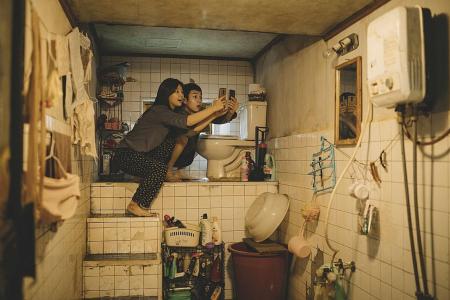Cannes winner Parasite captures wealth gap in 'basic unit of life'
Director of Cannes winner on social inequality
SEOUL : The South Korean director of Parasite, the tragicomic tale that won the top Palme d'Or prize at this year's Cannes Film Festival, described his film as "a candid portrayal of the rich and the poor".
Opening here tomorrow, it is a wickedly humorous suspense movie about class struggles set in modern South Korea, following a down-on-its-luck family of four who worm their way into jobs in a wealthy household.
"I think we're touching on courtesy toward human beings, human dignity," Bong Joon-ho, 49, said at a press conference in Seoul. "Whether one becomes parasitic, or symbiotic and coexistent in the best sense, I think might depend on how much courtesy one has toward human beings."
The unanimous decision to award Parasite the top prize at Cannes partly came down to its mash-up of genres, as the darkly comic tale doubles up as a thriller, with flashes of violence.
It was the first Palme d'Or at Cannes for a South Korean film.
Bong said he conceived and began writing Parasite in 2013, when he was filming the critically-acclaimed movie Snowpiercer starring Chris Evans.
Both movies portray the rich and the poor, but instead of the setting of a train in Snowpiercer, Bong said he focused Parasite on two families to show the wealth gap through "the most basic unit of our lives".
Parasite was even recently used by North Korea to claim its citizens live a better life than their cross-border neighbours.
"This film gaining popularity in South Korea is clearly letting people know that capitalism is a rotten and sick society with a malignant tumour of the growing gap between the haves and the have-nots that has no hope or future," said an editorial on the North Korean propaganda website DPRK Today.
"...In contrast, others admire and envy North Korea as anyone in the country lives a life with a sense of equality and fairness."
In reality, North Korea's system rewards individuals according to their perceived loyalty to the regime, which results in hugely differing living conditions and opportunities.
The country also suffers chronic food shortages and recorded its worst harvest for a decade last year, according to the United Nations, while average incomes were about 4 per cent of those in the South in 2017, according to the most recent statistics from Seoul.
But South Korea, Asia's fourth biggest economy, also grapples with social problems.
It currently has one of the world's lowest fertility rates, and scholars say social inequality - linked to the country's long work hours, high cost of housing, education and child rearing - is one of the major causes.
As of 2017, more than 17 per cent of the country lived in relative poverty, according to South Korean government data. - REUTERS/AFP
Get The New Paper on your phone with the free TNP app. Download from the Apple App Store or Google Play Store now




